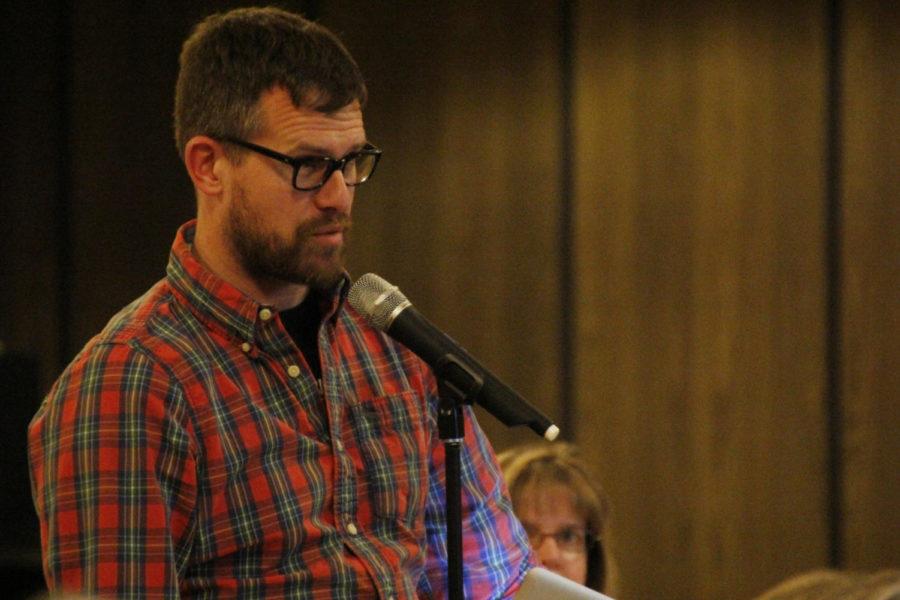Faculty Senate talks dead week, make-up work for students
Photo: Jonathan Krueger/Iowa State Daily
Kevin Amidon, associate professor in world languages and cultures, opposes a proposed amendment at the Faculty Senate meeting on March 12, 2013 in the Great Hall of the Memorial Union.
April 23, 2013
Discussion regarding dead week and students missing class for extra-curricular activities were main concerns at the latest Faculty Senate meeting.
Since April 2002, the dead week resolution has stated that class instructors are not able to give students new assignments or tests during dead week if these had not previously been stated in the syllabus. Last year, student representatives from Government of the Student Body reported a few cases where instructors gave additional work that was not on the syllabus.
Earlier this year, the Academic Affairs Council was charged with revising the dead week resolution to a dead week policy.
Rob Wallace, chairman of the Academic Affairs Council, said, “We’re revisiting this to try and bring more clarity and less ambiguity in the practice that we have been working with for 11 years. It is requested that the action that we take result in an actual policy [to be] followed and abided by as opposed to recommendations and suggestions [of a resolution].”
A change in the resolution was discussed and approved by the council and student representation from GSB in the Faculty Senate Executive Board meeting last week.
“We have distributed this to our student representatives, and we got no responses too negative,” Wallace said. “The idea is to take ambiguity out, and when we’re talking about specific exams and specific times, this removes all of that concern.”
If students feel wronged with a dead week conflict, they still have the ability to petition through the provost office or through a department chair.
Further discussion on amendments to the policy will take place at the next Faculty Senate meeting on May 7, 2013.
Make-up work due to missing classes for university extra-curricular activities was also contemplated.
An incident at Northern Iowa where a student missed a significant amount of class for National Guard service sparked the Senate to look into their current extracurricular policies. Until now, military service was not considered under the policy.
“As we were reviewing, we wanted to specify that form of extra-curricular activity that would potentially conflict with scheduled exams and assignments,” Wallace said. “[We wanted to] provide a universal or uniform policy for any of the university-related activities that students often ask to participate in.”
A few professors expressed concerns about students not selecting the most appropriate time to serve their military duty, stating that a separate policy states students should choose service times during the summer.
“I don’t see why military services fall under this rule. I don’t allow students to miss class to deliver pizza, and that is their job,” said Jana Byars from the History department. “I understand the National Guard is something different, but I had a student who wasn’t in class for two weeks because he was working at the Army office on campus, which is absolutely unacceptable. If they are in school, then school needs to be their priority.”
Another concern included in the issue of student absence is lacking in-class work experience.
“It’s one thing to schedule exams and make-up assignments, but it’s another thing where the course has to be experienced and the students have to perform,” said Joanne Olson, associate professor in the School of Education.
Olson gave an example of teacher education where students have to take a few weeks during the middle of the course to work at schools with children.
“We are doing things in class to make sure they are safe working with children. This experience is crucial, and I can’t replicate that by having a student come to my office. It is something that has to be experienced,” Olson said.
The conflict of jury duty is also being considered to be added to the document.
Both of these issues will be further discussed by the Senate Executive Board and brought up again in the next full Faculty Senate meeting on May 7.







